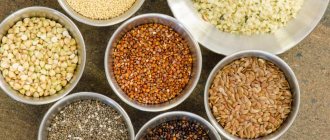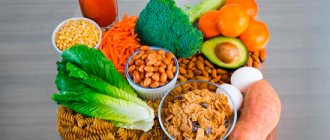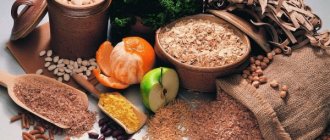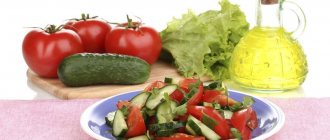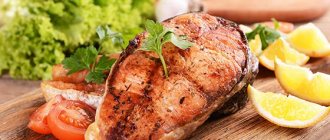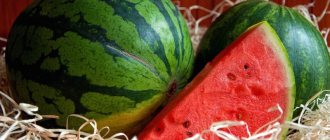Tatyana Kartavtseva — Feb 25, 2020 No comments
How to lose weight at home. Insulin index. Many women and men, girls and boys who are overweight think about this.
Anyone who plans to lose weight through starvation diets or intense physical activity can harm their body...
The cause of any human illness is acidification of the body , only this common cause causes any diseases that each person has their own... Methods for healing the body. I.P. Neumyvakin .
Professor of Medical Sciences I.P. Neumyvakin
Hello, dear readers of my blog.
Our health depends only on ourselves, our lifestyle, our habits and beliefs.
I am compiling a collection of folk treatment recipes based on publications and the Healthy Lifestyle Bulletin. This collection helps you quickly find the right folk recipe for treatment and apply it.
Traditional treatment recipes by diagnosis
How to lose weight without harm to your health
Nutritionist and head of the weight correction clinic A. Kovalkov gives recommendations on how to lose weight without harm to your health. I listened to the recommendations of the nutritionist and briefly wrote it down and saved it for myself. https://www.youtube.com/watch?v=kESo3aV-zgk
The normal level of insulin in the blood is from 2 to 27. After eating, the level of the hormone increases three times. On an empty stomach, the ideal value would be from 8 to 12 .
Insulin catastrophically changes the human body as a whole and leads to serious diseases:
- - male impotence
- - male insensitivity
- - female frigidity
- — oncology
- - atherosclerosis, etc.
Carbohydrate metabolism
The body receives the bulk of energy for life from the metabolism of carbohydrates. Very simply, the absorption of dietary carbohydrates can be represented by the following diagram:
- during the digestion of food, simple carbohydrates quickly and independently break down into glucose and fructose, and immediately enter the blood;
- complex carbohydrates require fermentation to be broken down;
- the process of food fermentation and an increase in blood glucose levels, in turn, triggers the mechanism for the production of insulin hormone by the pancreas - an insulin wave (insulin response).
Next, insulin needs to combine with glucose and “follow” through the bloodstream into muscle or fat tissue. In the absence of insulin, the cell membranes of these tissues are completely impermeable to glucose.
The required amount of glucose is immediately used by the body to maintain vital functions.
After polymerization, part of the glucose is converted into glycogen and deposited in the liver and muscles.
- liver glycogen maintains normal blood glucose levels between meals;
- muscle is stored in reserves for “help” in extreme situations, but is mainly used during prolonged or peak physical activity;
- the rest, insulin-bound glucose, is stored in fat cells.
Impaired sensitivity of fat cells to insulin, caused by impaired carbohydrate metabolism, leads to a post-receptor disorder of glucose metabolism - visceral obesity, which over time leads to type 2 diabetes mellitus.
If the pancreas does not respond adequately to increased blood sugar (produces insufficient amounts of the hormone), a very large amount of undigested glucose is constantly present in the bloodstream, and insulin-dependent diabetes develops.
An excess of insulin causes liver glycogen reserves to be used, turning it back into glucose. The liver, deprived of glycogen, issues an SOS command, thereby causing a false feeling of hunger. A vicious circle arises that leads to obesity, metabolic syndrome and type 2 diabetes.
It turned out to be important to know which products will satisfy the body's need for glucose. For example, 10 grams of carbohydrates contains:
- in a dessert spoon of honey (13 g);
- in half a medium apple (100 g);
- in a serving (100 g) of stewed beans;
- in 20 grams of white bread.
The easily digestible carbohydrates of honey will quickly pass from the gastrointestinal tract into the bloodstream, and the polysaccharides of an apple, beans or bread will take some time to break down. In addition, the same amount of initial carbohydrates will produce different amounts of glucose. It is for this comparison of products that the concept of the glycemic index was introduced.
Insulin index. How to lose weight.
Nutritionist A. Kovalkov spoke about the insulin index of food products, which affects the human body...
All diets consist of one parameter:
- - do not let your blood sugar level drop too low, otherwise hypoglycemia will begin
- - do not allow the sugar level to rise too high, so that it does not reach its threshold value...
If we manage to keep insulin low, and sugar does not fall below the level, this is an ideal option for losing weight. In this case, a fat-burning hormone must be present; if it is absent, then weight loss results will not be achieved.
The number 1 secret to losing weight is to competently take over insulin. Only insulin prevents fat-burning hormones from burning fat.
What should be done?
Avoid eating foods with a HIGH glycemic and insulinemic index.
The first is the rate of saturation of blood sugar in response to food intake. The second is how much insulin is released for this sugar.
Weight loss secret number 2 , how to make fat-burning hormones burn fat:
- - go to bed before 12.00 o'clock
- - eat little in the evening and eliminate carbohydrates
Growth hormone (somatotropic hormone) works only for 50 minutes during deep sleep from 00 o'clock to 01.00 o'clock...
What blood parameters need to be monitored?
Hormones in the blood need to be controlled:
- - somatotropic hormone
- - adrenaline
- - norepinephrine
- - testosterone
- - vitamin D
Glycemic index
- this is the rate of blood saturation with sugar. Each product has several glycemic indexes, and the indexes depend on many things - how it was prepared and what foods it is combined with...
Insulinemic index
The insulinemic index shows how much insulin is secreted by the pancreas in response to sugar received from food...
We get fat NOT from what we eat, but from how much we secrete the hormone - insulin .
For example:
COOK - cottage cheese contains calcium and calcium is absorbed only from natural high-quality cottage cheese. BUT even low-fat cottage cheese raises insulin levels more than a piece of chocolate, more than a cake. You can't eat cottage cheese in the evening.
The human body has somatotropic hormone or growth hormone - when a child grows, this hormone is responsible for growth. And when the child has already grown up, this hormone is responsible for burning fat at night and burning 150 grams of adipose tissue per night, working for only 50 minutes.
If insulin is released in the evening from eating, say, cottage cheese, insulin blocks growth hormone and fat burning will not occur at night.
Lard has a low insulinemic index. If you eat a piece of lard at night, almost no insulin will be released and will not block the somatotropic hormone, which burns fatty tissue in the body at night during sleep.
Insulin catastrophically changes the human body as a whole:
- - male impotence
- - male insensitivity
- - female frigidity
- — oncology
- - atherosclerosis, etc.
Products with a HIGH insulinemic index
which cannot be used systematically, only occasionally and little by little:
- sugar and all its derivatives - candies, sweets...
- flour and all its derivatives - baked goods, bread...
- potatoes and all its derivatives...
- polished white rice and its derivatives...
GRAPES - contains a high insulinemic and glycemic index and should not be eaten in large quantities...
POTATOES - has a high insulinemic and glycemic index...
LEGUMES - have a low glycemic index, but a fairly high insulinemic index...
Products with AVERAGE insulinemic index
which are constantly recommended in our diet . Desirable after physical activity, when blood sugar drops, tremors in the hands, headaches begin... you need to eat an apple, or better yet a BANANA... + physical activity...
APPLE - it contains carbohydrates, which releases insulin in the body for 3 hours and blocks the increase in fat cells...
ORANGES …
Whole grain BREAD , which contains a large amount of fiber, due to this fiber reduces the glycemic and insulinemic index...
BRAN or any fiber - they inhibit any glycemic index, they hit all of this, they reduce it and inhibit absorption and the sugar rises gradually...
HERCULES or oatmeal -
MEAT -
FISH -
Products with a LOW insulinemic index
which are more suitable for breakfast and dinner...
- - dark dark chocolate without sugar - you can eat even half a bar, insulin will not be released, because... there is no sugar and the inhibition reaction of the most important somatotropic hormone will not take place...
- - fatty cheese
- - apricots
- - pearl barley
- – peanuts – nuts consist of 80% fat
The combination of products is very important. Each person is born with his own genetically programmed pancreatic response to some product. Sugar levels do not always coincide with the response of the pancreas.
General recommendations
To ensure that your diet is beneficial, follow the rules described below.
- Choose your food combination carefully. When eating carbohydrates, add saturated fat. For example, salmon avocado nuts.
- Avoid eating high GI foods (watermelon, baked goods, fried foods, yogurt).
- Do not eat fast carbohydrates and starchy foods after 14:00.
- Try to make the majority of your breakfast protein. Avoid cereal and milk or fruit juice, as this can cause a large insulin spike.
- Try not to consume dairy products in the afternoon.
- Eat complex carbohydrates and protein for dinner. The optimal combination would be chicken breast and buckwheat or bulgur.
- Read labels carefully before purchasing products. If they contain a sweetener (maltodextrin, malt, xylose, syrup, etc.), do not purchase them.
To reduce the insulin index of coffee and tea, consume them without sugar. If desired, add lemon or natural sweetener stevia to the drink.
Try not to lean on the dried apricots. Dried fruits have a concentrated sugar content, which causes a sharp rise in blood glucose levels. Replace dried fruits with fresh, low-GI foods such as pomegranate, apples or grapefruit.
On the one hand, it seems clear: the glycemic index shows the degree of saturation of the blood with sugar, and the insulin index shows the rate of nisulin production for the quality absorption of food. However, although the table is a convenient tool in diet planning, you should also understand the rules for consuming foods with different AIs.
A complex approach
Important points:
- both indices are significant only in combination with the so-called “insulin response”;
- a combination of different food names can lead to a very unexpected result;
- This means that when compiling rations, menus and diets, not only product indices should be taken into account, but also the body’s personal perception, food ensemble, lifestyle (physically active, inactive, stress, nervous tension, age, etc.).
Sometimes people, when playing sports, unwittingly drive themselves into hypoglycemia (too low sugar levels). How does this happen:
- take fast proteins - milk and whey;
- a lot of insulin is released into the blood;
- an insulin surge leads to a sharp drop in sugar levels;
- a person feels weak and really wants to eat something (something filling, nutritious);
- obeying an uncontrollable feeling of hunger, a person begins to absorb new food (this behavior is dictated by the body, which requires restoration of sugar levels);
- The result is excess weight gain.
How to check insulin levels in the body
Sugar is only a signal that has entered the body and the pancreas immediately releases insulin.
It is very important to just go to the doctor and get your insulin and sugar tested. Sound the alarm and start treatment to lower insulin levels.
Diabetes mellitus begins with high insulin, but sugar is still low. For example, sugar is still 5.4 and insulin on an empty stomach is already 20. This is already a threat of the formation of ONCOLOGY, etc.
If you have high insulin levels, you will never lose weight. And it will end someday. Insulin begins to fall, and sugar increases, which leads to a serious illness - INSULIN DEPENDENT DIABETES.
The good, the bad, the treacherous
It will be interesting to know that some popular products in the hands of researchers, on the contrary, have demonstrated that they have virtually no effect on the speed and volume of insulin production. This means that dishes made from them can keep you full for a long time! Here is this nice list:
- Olive oil - AI = 3
- Avocado - AI = 5
- Walnuts - AI = 6
- Tuna - AI = 16
- Chicken - AI = 20
The opposite is foods with the maximum insulinemic index. Their listing will come as a surprise to those who have studied the topic of the glycemic index. The record holders for AI are the same simple carbohydrates and sources of starch:
- Jelly Candies - AI = 120
- Pancakes and pancakes made from white flour - AI = 112
- Melon - AI = 95
- Potatoes - AI = 90
- Breakfast cereal - AI = 70-113 (depending on composition, additives and sweeteners used in production)
Finally, two sneaky foods have an unexpectedly high insulinemic index compared to a relatively low glycemic index. These are yogurt (its GI is from 35 to 63 depending on the composition, and AI is 90-115!) and oranges (with a low GI of no more than 40, their AI rises to 60-70). If everything is more or less clear with oranges, then scientists have not yet agreed why yogurt makes insulin “jump” so seriously - apparently, it’s a combination of galactose and proteins in the composition.
What to do: remember the synergistic effect
Insulin-raising yogurt with the addition of fruits and other products with simple sugars is not an important combination if you are watching your health and figure. And yogurt with orange turns out to be a test of pancreatic strength! But now you have another reason to add healthy fats (nuts, butter and avocado) and chicken and tuna to your menu - you may have already noticed that these foods make you forget about hunger, but now you know that it's not just about your stomach , but also in hormones
Excess weight. How to get rid of excess weight.
What do you need to know?
It is impossible to get rid of excess weight with a diet unless the cause of obesity is eliminated.
If a person does not eat after six in the evening , then he fasts for at least 12 hours. But if a person fasts for more than 10 hours, then the body produces a certain enzyme - lipoprotein kinase, which is responsible for the further transformation of food into fats.
Should you drink 2 or more liters of water per day ? All people are different, with different lifestyles and areas of residence. Each body is individual and you need to drink water according to your needs .
Eating less doesn't help you lose weight either. It all depends on the product you eat, let’s say chocolate - even from half a serving - blood sugar is guaranteed and obesity is also guaranteed.
Physical activity in the gym - muscle mass is built up, fat is removed and the waist size becomes even larger.
Fasting days - if there is a need to unload the stomach.
Yogurt is doubly healthy if combined with cucumber
Eating foods that do not provoke a surge in blood sugar levels and the release of insulin is considered reliable insurance against the occurrence of insulin resistance syndrome. This metabolic disorder occurs when tissues lose sensitivity to the hormone. The consequences are bleak: obesity and a whole bunch of diseases.
An unexpected way out of this dilemma was found by Swedish researchers Elin Yustman, Helena Liljeberg Elmsthal and Inger Bürk. They published the results of a study in the American Journal of Clinical Nutrition in which 10 volunteers took part. Scientists have found that although yogurt and other products made from fermented (fermented) milk have a high insulinemic index, when combined with another source of organic acids (pickled cucumbers played this role in the experiment), they reduce the rate of insulin release even if together with They eat white bread, this example of absolute insulin evil. Whole milk and fresh cucumbers, which is typical, did not have such an effect (no matter how ironic this food tandem may look).
How to lose excess weight. What products to exclude.
How to remove extra 5 - 6 kg of excess weight yourself at home?
The recipe is very simple, which is suitable for absolutely everyone, exclude 4 products from your diet :
- - sugar and everything containing sugar
- - flour and everything that contains flour
- - potato
- - white polished rice
Walk a lot, about 5 km a day, move. Under this condition, 5 - 6 kg of fat are easily removed from the body.
Start your morning with a glass of water.
Mineral water with a high content of magnesium - magnesium is the only substance that is responsible for relaxing blood vessels; magnesium will help you relax and prevent a heart attack.


